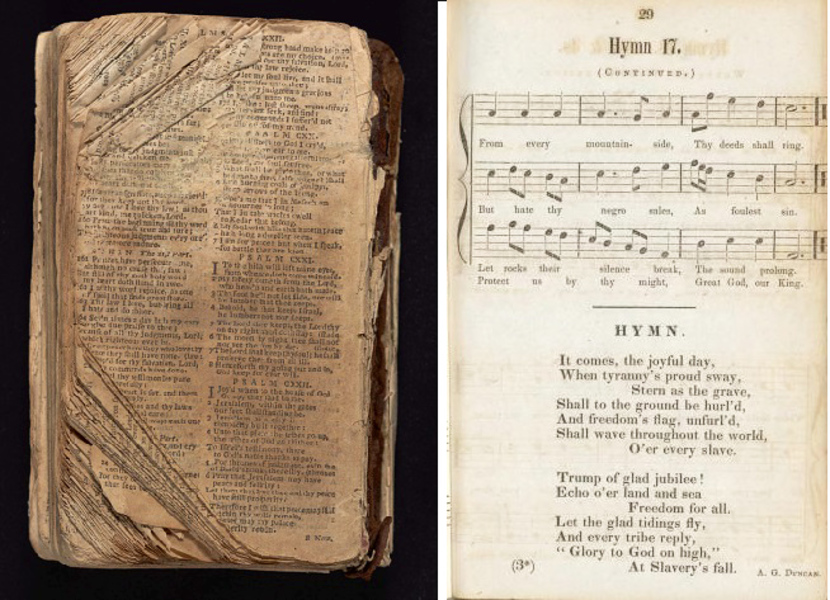*Caroline W. Healey Dall (1822–1912)
From _American Antislavery Writings: Colonial Beginnings to Emancipation_*

Above left: Bible belonging to Nat Turner. The surviving artifact is missing its front and back cover. (Collection of the Smithsonian National Museum of African American History and Culture, Gift of Maurice A. Person and Noah and Brooke Porter) Above right: Page from Anti−Slavery Melodies; for The Friends of Freedom, 1843, edited by Jarius Lincoln. (Old Sturbridge Village Museum, via TeachUSHistory.org)
When Caroline Healey was nineteen (before she became Caroline Dall), she attended the series of popular “conversations” for Boston-area women led by Margaret Fuller. Designed to encourage “independent thinking” among the participants, the two-hour sessions covered a variety of topics, such as art history and Greek mythology. (An attempt to open one evening to both sexes failed because “the men took over the discussion and performed for each other.”)
“Margaret did not like me,” Dall later recalled, “indeed my presence at her conversations irritated her.” Many of the other attendees regarded the young woman as too assertive, yet it is largely through her fastidious notes that we know of these conversations. She eventually became an important figure in her own right and earned the respect of her contemporaries; her friends and acquaintances included Elizabeth Peabody, Ralph Waldo Emerson, Louisa May Alcott, Theodore Parker, Frederick Douglass, Susan B. Anthony, and hundreds of other prominent nineteenth-century figures.
Dall also published dozens of essays and books, ranging from Woman’s Rights under the Law (1861) to What We Really Know about Shakespeare (1885) to Transcendentalism in New England (1897). Even more important, perhaps, are her meticulously kept journals, which span from 1838 until her death in 1912 and which constitute (in the words of biographer Helen Deese) “the fullest account of an American woman’s life in the nineteenth century.”
For our Story of the Week selection we present one of Dall’s earliest published pieces. In 1846, as a newlywed living with her Baltimore in-laws for a year, she profiled for the Christian World newspaper the lives and hardships of several free blacks who lived in the area. From these acquaintances, she learned of the case of Sherry Williams, who was convicted for owning a hymnbook containing antislavery lyrics and drawings and was sentenced to ten to twenty years in the state penitentiary. Dall’s account of this tragedy, “A Sketch from Maryland Life,” appeared in an annual gift book published by the abolitionist William Lloyd Garrison.
Read “A Sketch from Maryland Life” by Caroline W. Healey Dall



